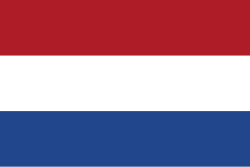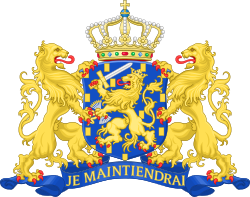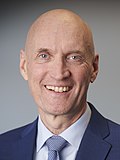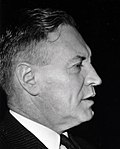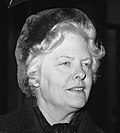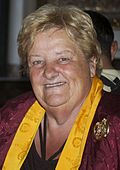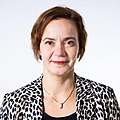State Secretary for Portfolio(s) Term of office Party Cabinet Piet Muntendam (1901–1986) • Primary Elderly care Disability policy 1 April 1950 – Labour Party Drees–Van Schaik [ 32] [ 2] Aat van Rhijn (1892–1986) • Social security Occupational 15 February 1950 – Labour Party State Secretary for Social Portfolio(s) Term of office Party Cabinet Piet Muntendam (1901–1986) • Primary Elderly care Disability policy 15 September 1951 – [Res] Labour Party Drees I • II [ 2] [ 3] Aat van Rhijn (1892–1986) • Social security Occupational 15 September 1951 – Labour Party Drees I • II • III [ 2] [ 3] [ 4] Bauke Roolvink (1912–1979) • Social security Occupational 15 June 1959 – Anti-Revolutionary Party De Quay [ 6] Louis Bartels (1915–2002) • Primary Elderly care Disability policy Medical ethics 3 September 1963 – Catholic People's Party Marijnen [ 7] Cals [ 8] Zijlstra [ 9] José de Meijer (1915–2000) • Occupational Public 15 November 1963 – Catholic People's Party Marijnen [ 7] Cals [ 8] Zijlstra [ 9] Roelof Kruisinga (1922–2012) • Primary Elderly care Disability policy Medical ethics 18 April 1967 – Christian Historical Union De Jong [ 10] State Secretary for Health Portfolio Term of office Party Cabinet Jo Hendriks (1923–2001) • Primary Elderly care Disability policy 11 May 1973 – Catholic People's Party Den Uyl [ 12] Els Veder-Smit (1921–2020) • Primary Elderly care Disability policy Medical ethics Food policy 3 January 1978 – People's Party for Van Agt I [ 13] Ineke Lambers-Hacquebard (1946–2014) • Environmental Food policy 11 September 1981 – Democrats 66 Van Agt II • III [ 14] [ 15] State Secretary for Welfare, Portfolio(s) Term of office Party Cabinet Joop van der Reijden (1927–2006) • Primary Elderly care Disability policy Medical ethics 5 November 1982 – Christian Democratic Appeal Lubbers I [ 16] Dick Dees (born 1944) • Primary 14 July 1986 – People's Party for Lubbers II [ 17] Hans Simons (1947–2019) • Primary Elderly care Youth care Disability policy 7 November 1989 – [Res] Labour Party Lubbers III [ 18] State Secretary for Health, Portfolio(s) Term of office Party Cabinet Erica Terpstra (born 1943) • Social services Elderly care Youth care Disability policy Minorities Food policy Sport 22 August 1994 – People's Party for Kok I [ 19] Margo Vliegenthart (born 1958) • Elderly care Youth care Disability policy Pharmaceutical Sport 3 August 1998 – Labour Party Kok II [ 20] Clémence Ross-van Dorp (born 1957) • Elderly care Youth care Disability policy Medical ethics Sport 22 July 2002 – Christian Democratic Appeal Balkenende I II • III [ 21] [ 22] [ 23] Jet Bussemaker (born 1961) • Elderly care Youth care Disability policy Medical ethics Sport 22 February 2007 – [Res] Labour Party Balkenende IV [ 24] Marlies Veldhuijzen van Zanten (born 1953) • Elderly care Youth care Disability policy Medical ethics Pharmaceutical 14 October 2010 – Christian Democratic Appeal Rutte I [ 25] Martin van Rijn (born 1956) • Elderly care Youth care Disability policy Medical ethics Pharmaceutical 5 November 2012 – Labour Party Rutte II [ 26] Paul Blokhuis (born 1963) • Social services Disability policy 26 October 2017 – Christian Union Rutte III [ 27] Maarten van Ooijen (born 1990) • Youth care Preventive care 10 January 2022 – Christian Union Rutte IV [ 28] Vicky Maeijer (born 1986) • Long-term care Social care 2 July 2024 – Party for Freedom Schoof [ 29] Nicki Pouw-Verweij (born 1991) 19 June 2025 – Incumbent Farmer–Citizen Movement Vincent Karremans (born 1986) • Youth care Preventive care Sport 2 July 2024 – People's Party for Judith Tielen 19 June 2025 – Incumbent People's Party for 
